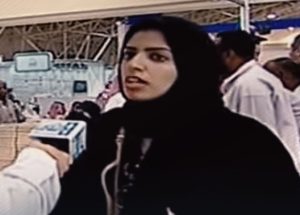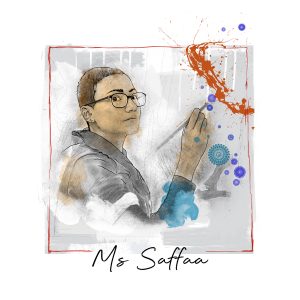Index relies entirely on the support of donors and readers to do its work.
Help us keep amplifying censored voices today.

Salma is one of many Saudi prisoners of conscience to go on hunger strike
Salma al-Shehab, a 34-year-old mother of two and former PhD student at the University of Leeds, who in 2021 was handed a 34-year-long jail sentence for tweeting her support for women’s human rights defenders in her native Saudi Arabia, has gone on hunger strike.
Salma was arrested in January 2021 while on a visit home from the UK to see her family. She then faced months of interrogation over her activity on Twitter.
In March 2022 she was sentenced to six years in prison by the country’s Specialized Criminal Court (SCC) under the vague wording of the country’s Counter-Terrorism Law, but this was increased on appeal to an unprecedented 34-year term followed by a 34-year travel ban.
The SCC was originally established to try terrorism cases but its remit has widened to cover people who speak out against human rights violations in the country. Salma is one of a number of people tried by the SCC who have been handed farcically long sentences for simply expressing their human rights. The SCC is the main tool with which Saudi Arabia has effectively criminalised freedom of expression.
In January this year, Salma’s sentence was reduced to 27 years after a retrial was ordered. During the retrial, the presiding judge denied Salma the right to speak in her defence.
Salma has been joined on hunger strike by seven other prisoners of conscience, who have been handed jail terms longer than those which would be handed out to hijackers threatening to bomb a plane.
In Saudi Arabia, prisoners of conscience often go on hunger strike to protest their treatment. Those resorting to this include women’s rights activist Loujain Al-Hathloul, the blogger Raif Badawi, the academic and human rights defender Mohammad al-Qahtani, the writer Muhammad al-Hudayf and the lawyer Walid Abu al-Khair.
ALQST’s head of monitoring and advocacy, Lina Alhathloul, the sister of Loujain, said: “Knowing how harshly the Saudi authorities respond to hunger strikes, these women are taking an incredibly brave stand against the multiple injustices they have faced. When your only way of protesting is to risk your life by refusing to eat, one can only imagine the inhumane conditions al-Shehab and the others are having to endure in their cells.”
ALQST says that in previous hunger strikes, prison officials often wait several days before taking any action. “When they have eventually acted, it has been to threaten the prisoners with punishment if they continue their strike, and then place them in solitary confinement in dire conditions, subjecting them to invasive medical examinations and threatening to force-feed them. Phone calls, visitors and activities are also denied, in an attempt to coerce prisoners to end their hunger strikes,” the organisation said.
Salma and her fellow hunger strikers should never have been arrested and jailed in the first place for simply exercising freedom of expression that people take for granted in countries other than Saudi Arabia. They should have their sentences quashed and released from prison immediately.
“Are you proud of being Foreign Secretary of a country that trades with a country that actually crucifies people in public?”
Interviewer Jayne Secker had a point when she asked James Cleverly this on a Sky TV show last weekend.
The Foreign Secretary was quick to respond to the allegation.
“I have spoken with the Saudis about our long-standing principled position on the death penalty as I do with pretty much all countries around the world that maintain the death penalty. Saudi is…an important, influential country in the Middle East and it’s incredibly important that we maintain an ongoing bilateral relationship with Saudi. Some of that includes trade but also in terms of security counter-terrorism work…We have seen real changes over the last decade [but] I want to see those changes go further and faster.”
In its recently released 2021 Report, the FCDO points to progress in the country’s application of the death penalty – “only” 65 individuals were executed in 2021 and the FCDO reports this is a decrease from 184 executions in 2019. The FCDO suggested this may be related to death penalty reforms announced in 2020, including a moratorium on the death penalty for drug-related offences and ‘discretionary’ crimes committed by juveniles.
This ‘leniency’ has not lasted. In the year to the end of November 2022, 144 people had been executed including 81 on a single day in March.
Many argue that Saudi’s growing importance to the UK, particularly during the war in Ukraine is blinding the UK government to human rights abuses in the country – or at least giving them cover for their current level of inaction. Saudi Arabia is the UK’s 25th largest trading partner, accounting for £13.7 billion of imports and exports of goods and services. The figure is up 25.9% year on year, meaning that there will be pressure from the Treasury and the Prime Minister to keep relations cordial.
The FCDO clearly has concerns about Saudi. In the report, it says of the country that “political space and freedom of expression remained severely restricted, and there remained a culture of self-censorship and fear”.
However, it recognised progress on women’s rights, citing the lifting of restrictions on female employment, the reform of guardianship laws and the release of prominent women’s rights defenders, including Loujain al-Hathloul.
One woman who has not been released is University of Leeds student Salma al-Shehab. It is now 23 months to the day since Salma was arrested when she returned from the UK, where she was studying for a PhD in dental hygiene, to Saudi to visit her family.
Salma had infuriated the Saudi regime solely for tweeting her support for Saudi women’s rights defenders like Loujain al-Hathloul. So while the release of Loujain al-Hathloul gave the Saudi regime a few positive lines in the FCDO report, other people, like Salma, remain in prison.
Salma was later sentenced by Saudi’s notorious Specialized Criminal Court (SCC) under various parts of the country’s Counter-Terrorism Law and the Anti-Cybercrime Law for “supporting those seeking to disrupt public order, undermining the safety of the general public and stability of the state, and publishing false and tendentious rumours on Twitter.
Her sentence is 34 years in prison, longer than the sentence that would be applied to a terrorist bomber or hijacker. Like other Saudi women who fall foul of the regime, Salma has also been slapped with a travel ban for a further 34 years following her sentence.
The FCDO promises it will do more.
In the report, it says: “The UK will continue to engage closely with the Saudi authorities, particularly in areas where there is real Saudi appetite for change such as judicial reforms, women’s rights and the death penalty. The UK will continue to raise individual cases of human rights concerns with Saudi counterparts at ministerial and official level and attempt to attend these trials.” Confirming that UK engagement will be potentially guided by “areas where there is real Saudi appetite for change” enables the regime to dictate terms and raises the obvious question – what will the UK do to increase that appetite to other areas of importance, such as reform of the SCC and ending the criminalisation of online free expression?
The signs are not great. A letter we sent to James Cleverly in October along with 13 other human rights organisations elicited a weak response from the Foreign Secretary’s office. Others are also not convinced by the FCDO’s promises to press the Saudis further. The London-based NGO ALQST, established in 2014 by Saudi Arabian human rights defender Yahya Assiri, has issued its own report, Human Rights and the UK-Saudi Relationship, in the past week.
In it, ALQST says the FCDO’s report gives “an unduly generous account of the Saudi leadership’s reform programme, and accepted several claims by the authorities that observers on the ground have strongly challenged”.
It goes on to make 17 recommendations to the UK government, including exerting public and private pressure on the Saudi Arabian authorities to improve their human rights record, including on thematic issues and, crucially, individual cases of concern.
It also calls for consular and embassy officials to continue to request access to relevant trial hearings such as those involving prisoners of conscience, and the UK government should press the Saudi authorities on the issue of court access in support of the right to a fair and open trial. The likelihood of this happening is remote. In a response to a written question tabled by Conservative MP Crispin Blunt on 19 March 2020, relating to the trial of Saudi women’s rights activists in particular, the Government said “The UK attends trials of international importance in all countries where permitted. The UK, along with other embassies in Saudi Arabia, has requested and been denied access to each and every trial we have been aware of since October 2018, with the exception of the trials for those involved in the killing of Jamal Khashoggi.”
It has also called for the UK government to designate Saudi Crown Prince Mohammed bin Salman, who is on the shortlist for Index’s Tyrant of the Year poll, as an individual target for financial sanctions under the UK Global Human Rights regime.
However, the US Government’s decision to grant the prince sovereign immunity in the civil case over the murder of Khashoggi makes this recommendation seem like an exercise in wishful thinking as opposed to something with a genuine chance of success.
According to Cleverly, the UK government will not comment on incidents, instead prioritising actions. In his words “Britain has agency and leverage and we are using it to shape the course of events.” He is saying this at a time where a significant number of British citizens, or those connected to the UK, have been persecuted and detained by authoritarian states. This includes Alaa abd el-Fattah, imprisoned in Egypt, Jimmy Lai who is charged under Hong Kong’s National Security Law, as well as Index award-winner, Sophia Huang Xueqin, who, while not a British citizen, was selected for a Chevening Scholarship prior to her arrest and disappearance in China. While it was hoped that the UK government had learnt lessons from what happened to Nazanin Zaghari-Ratcliffe, whose detention in Iran was arguably prolonged by UK government actions, this frailty at the heart of the UK’s foreign policy sends a powerful signal to those seeking to silence British citizens – you can do so with very little resistance from the UK government. It also tells British journalists, researchers, academics or anyone who expresses themselves online, please do not depend on us.
If there is a single case where the UK government could really prove its intention to hold Saudi Arabia and others to account when it comes to human rights, it is that of Salma al-Shehab. It is a case where the alleged crime took place in the UK. If James Cleverly really wants to send a message to the country’s leaders that the relationship between the two countries isn’t just about trade, he should call for her immediate release.
 I love working at Index but it isn’t always an emotionally easy place to work. Every day my team and I are exposed to some of the most heartbreaking stories of human rights abuses around the world. We routinely have to read the details of toture, persecution, detention and murder and whilst we try not to become immune to the daily horrors – sometimes that is the only way to do our jobs.
I love working at Index but it isn’t always an emotionally easy place to work. Every day my team and I are exposed to some of the most heartbreaking stories of human rights abuses around the world. We routinely have to read the details of toture, persecution, detention and murder and whilst we try not to become immune to the daily horrors – sometimes that is the only way to do our jobs.
However there will always be a case that makes us collectively stop. A person’s story that makes us feel impotent. That touches our hearts. That demands even more from us. That personifies the reason why Index was established in the first place – and sometimes it won’t be the most graphic of cases – but rather one so unjust we cannot move on.
And that happened again this month.
There has been limited media coverage about Salma al-Shehab. An academic, a PhD student at the University of Leeds. A wife, a mother of two and a Saudi citizen. She also happened to occasionally use Twitter to support the plight of women in Saudi and to call on those dissidents and clerics who had been detained to be released. She isn’t a leading political activist or a leading light of a human rights organisation – her PhD is in medicine.
Last year Salma returned to Saudi on holiday and was immediately arrested, tried and convicted by a terrorism tribunal of aiding dissidents seeking to “disrupt public order” and publishing “false rumours”. Her initial sentence was six years in detention. However this month, after an appeal, her sentence has been increased to 34 years followed by a 34-year restriction on travel. For the ‘crime’ of occasionally using social media while in the UK to highlight the detention of others in Saudi Arabia, she will be held in a Saudi prison until she is 68 years old and will not be allowed to leave Saudi Arabia again until she is 102.
This is the longest sentence ever issued by a Saudi court for a peaceful activist. To all intents and purposes it is little short of a death sentence. For the crime of using social media.
Salma deserves more than the words of protest that come from Index and others, although we do protest her arrest and are horrified by her treatment. She deserves her liberty. She has been imprisoned for using her voice, when in a democratic country, to defend others who no longer are able to be heard. She acted in the best traditions of a dissident.
So from here on in, Index will seek to use its voice to raise hers. We will not let the world forget her, as she sits in a Saudi prison.
On the 15th of every month (she was initially arrested on 15 January 2021), we will tell her story. Shining a light on her plight. And in the coming months we will work with partners both in the UK and across the world to make sure her case doesn’t get forgotten as just another case of human rights abuse by Saudi Arabia.
[vc_row][vc_column][vc_video link=”https://youtu.be/i_eRNjepHBg”][vc_column_text] Ms Saffaa is a self-exiled Saudi street artist living in Australia who uses murals to highlight women’s rights and human rights violations in Saudi Arabia.
Ms Saffaa is a self-exiled Saudi street artist living in Australia who uses murals to highlight women’s rights and human rights violations in Saudi Arabia.
Collaborating with artists from around the world, she often focuses on Saudi women, their individuality and autonomy. She challenges Saudi authorities’ linear and limited narrative of women’s position in Saudi society, and offers a counter narrative. Recently, she has also focussed on human rights and the murder of Jamal Khashoggi.
Part of a new generation of Saudi activists who take to social media to spread ideas, Ms Saffaa’s work has acquired international reach. Through her use of social media and collaborations, Ms Saffaa amplifies her subjects’ voices online, beyond their life on a wall.
“I am my own guardian”, a series of murals she created in 2012-13, made waves in Saudi Arabia and internationally. This was a protest against restrictive guardianship laws that mandate women must have a male guardian’s permission to get married, undertake education, have elective surgery or even to open a bank account. She depicted Saudi women wearing the male Saudi headdress, with banners across their mouths saying: “I Am My Own Guardian”.
In 2016, a conservative Saudi man discovered her work and abused her on Twitter. This sent Ms Saffaa trending. Many activists retweeted her artwork, and used it in a movement protesting against Saudi Arabia’s guardianship laws, which used the artwork as the unofficial logo.
Ms Saffaa has faced online threats, harassment, and in 2017, after an interrogation by the head of intelligence at the Saudi embassy in Canberra, her passport renewal request was denied, leaving her stranded in Australia with a de facto travel ban.
With crown prince Mohammed Bin-Salman’s rise to power, expressing dissent or challenging the Saudi leadership has become even more dangerous. After the murder of prominent journalist Jamal Khashoggi, it is clear that dissidents face repression beyond a travel ban, and regardless of whether they live in the country or abroad.
In 2017, a mural celebrating Saudi women and the 150th day of the “I am my own guardian” movement was vandalised. In 2018, she recreated the defaced artwork with support from Peter Khalil, an Australian Labor MP. The new mural included the work of 10 local and international female artists as collaborators. On the week of International Women’s Day, she created a mural in Sydney to celebrate Saudi women’s resilience. It features two portraits of prominent Saudi activists imprisoned on terrorism charges. In November 2018, Ms Saffaa collaborated with renowned American artist and writer Molly Crabapple on a mural celebrating Jamal Khashoggi that read, “We Saudis deserve better.”[/vc_column_text][vc_separator][vc_row_inner][vc_column_inner width=”1/2″][vc_single_image image=”104691″ img_size=”full” onclick=”custom_link” link=”https://www.indexoncensorship.org/2019/01/awards-2019/”][/vc_column_inner][vc_column_inner width=”1/2″][vc_column_text]
Index on Censorship’s Freedom of Expression Awards exist to celebrate individuals or groups who have had a significant impact fighting censorship anywhere in the world.[/vc_column_text][/vc_column_inner][/vc_row_inner][vc_separator][/vc_column][/vc_row][vc_row][vc_column][vc_basic_grid post_type=”post” max_items=”4″ element_width=”6″ grid_id=”vc_gid:1551786362908-3b759dfe-64e8-9″ taxonomies=”26925″][/vc_column][/vc_row]